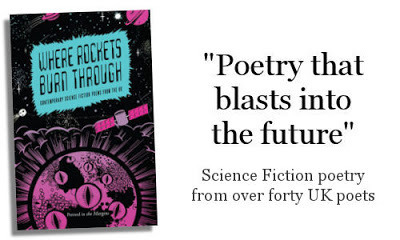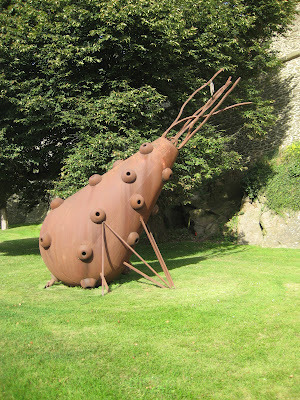Ken MacLeod's Blog, page 13
November 15, 2012
Where Rockets Burn Through

For the second time in forty years, I'm a properly published poet, and in very distinguished company at that. Anthologies of science fiction poetry are almost as infrequent: this is the first I've seen since Frontier of Going and Holding Your Eight Hands came out in the Seventies. Edited by scholar and poet Russell Jones, introduced by Alasdair Gray, and inspired by (and featuring) the science fiction poetry of the late great Scottish Makar Edwin Morgan, Where Rockets Burn Through should rise higher and travel farther than its predecessors.
Free launch events: Edinburgh, Thursday 29 Nov and London, Thursday 6 December.
The Edinburgh event will feature readings by several local writers, including me. You have been warned.
Thursday 29 November, 6.30pm
Blackwell’s 53-59 South Bridge Edinburgh
FREE
Published on November 15, 2012 03:50
November 13, 2012
The Soul of Man after Socialism
I have another article up at the new online magazine Aeon, this time elaborating on some points about socialism and (post)humanism that I've made earlier. 
Published on November 13, 2012 05:03
October 31, 2012
Cell Culture - Examining how science and literature interact
I've been remiss in not proclaiming earlier that I'm taking part in an event this Saturday, 14.00 to 15.45, at the Scottish Storytelling Centre on the High Street:
Finally, speaking of events, a wee reminder that Iain Banks and I are manifesting on Friday evening at the Linlithgow Book Festival.
How accurately does modern literature portray the life sciences? In what way is the use of science within fiction evolving to create new genres such as “lab-lit”? Is there more in common, than is often imagined, between the way in which both writers and scientists work?Tickets £5 - booking details here.
These are some of the fascinating topics that are up for discussion in an afternoon of fact and fiction examining how fiction portrays life sciences and genetics. The event is being produced by the ESRC Genomics Policy and Research Forum, in conjunction with the Scottish Storytelling Centre, on Saturday 3 November 2012.
Cell Culture will feature participants including: Dr Jennifer Rohn, cell biologist, editor of Lablit.com and author of Experimental Heart and The Honest Look; Ken MacLeod, celebrated science fiction author; and Pippa Goldschmidt, short story writer and former writer-in-residence at the Genomics Forum.
The authors will read from their work before engaging in a public discussion which will be chaired Professor Stuart Monro, Scientific Director of Dynamic Earth.
Finally, speaking of events, a wee reminder that Iain Banks and I are manifesting on Friday evening at the Linlithgow Book Festival.
Published on October 31, 2012 13:56
October 2, 2012
Yet another classic!
The left-libertarian Center for a Stateless Society has republished yet another of my blasts from the past, this time a sympathetic but dissenting rant I wrote for the perennially fascinating (to me, anyway) Socialist Party of Great Britain on the occasion of its centenary in 2004.
Trainspotters of the political fringe may be amused to note, in that same centenary issue, a stirring call to smash cash, written in 1968 by David Ramsay Steele, one of whose later writings convinced me (eventually) that you can't. He went on to state the case more clearly, comprehensively, and readably than anyone before or since in a very interesting book.
Trainspotters of the political fringe may be amused to note, in that same centenary issue, a stirring call to smash cash, written in 1968 by David Ramsay Steele, one of whose later writings convinced me (eventually) that you can't. He went on to state the case more clearly, comprehensively, and readably than anyone before or since in a very interesting book.
Published on October 02, 2012 07:10
October 1, 2012
Two links
The left-wing market anarchists at Center for a Stateless Society have reprinted (with my permission and the publisher's) my Introduction to the American edition of The Star Fraction, as part of their ongoing series of left-libertarian classics. I hardly think it's anything of the kind, but who am I to argue? If it works to subvert the dominant paradigm, fine by me. (I'm not saying which dominant paradigm.)
The Herald magazine on Saturday published an interview with me, which is I think the first time I've ever featured in a lifestyle supplement. Thanks to Mike Calder of Transreal for the use of his shop for the photograph (in the print version only) of me holding a soft toy dinosaur and grinning wanly.
The Herald magazine on Saturday published an interview with me, which is I think the first time I've ever featured in a lifestyle supplement. Thanks to Mike Calder of Transreal for the use of his shop for the photograph (in the print version only) of me holding a soft toy dinosaur and grinning wanly.
Published on October 01, 2012 04:14
September 30, 2012
The Awakeness
Last week I had a short piece on two types of odd but unmystical experiences published at the new and interesting magazine Aeon. One of these is a peculiar, spontaneous iteration of self-awareness where it feels surprising to be me. In the article I asked if anyone else had it.
The response: lots of comments saying 'Oh, I have that too!'
Since writing it, I came across two things that seem relevant to the odd experience.
One is that I remembered a passage I'd read years ago - it may have been an essay in the now legendary anthology The Mind's I - in which the writer imagined abstracting from every personal feature of one's consciousness, and pointed out that what remained would be what is common to all conscious beings. What struck me is that if one could step back into that consciousness-as-such, one would have something like the experience I described.
Another was reading Chris Beckett's Dark Eden. One of the characters, Jeff, is an odd little tyke with the habit of saying, every so often and apropos of nothing: 'We're here. We really are here.' Later in the book we get inside his head, and find that he (unlike everyone around him) sees 'the same Awakeness' in the flat, blank eyes of the alien animals as people do in each other and remember in Earth animals. This is more or less what Schopenhauer said in opposition to Descartes and Spinoza: that animals may not think or reason, but they share the same awareness as we do, just by being aware.
I don't know where that line of thought is going, but if you're interested, have a look at my article, and especially the comments. And give Aeon a browse too - there's a lot of interesting stuff there that you won't find anywhere else.
The response: lots of comments saying 'Oh, I have that too!'
Since writing it, I came across two things that seem relevant to the odd experience.
One is that I remembered a passage I'd read years ago - it may have been an essay in the now legendary anthology The Mind's I - in which the writer imagined abstracting from every personal feature of one's consciousness, and pointed out that what remained would be what is common to all conscious beings. What struck me is that if one could step back into that consciousness-as-such, one would have something like the experience I described.
Another was reading Chris Beckett's Dark Eden. One of the characters, Jeff, is an odd little tyke with the habit of saying, every so often and apropos of nothing: 'We're here. We really are here.' Later in the book we get inside his head, and find that he (unlike everyone around him) sees 'the same Awakeness' in the flat, blank eyes of the alien animals as people do in each other and remember in Earth animals. This is more or less what Schopenhauer said in opposition to Descartes and Spinoza: that animals may not think or reason, but they share the same awareness as we do, just by being aware.
I don't know where that line of thought is going, but if you're interested, have a look at my article, and especially the comments. And give Aeon a browse too - there's a lot of interesting stuff there that you won't find anywhere else.
Published on September 30, 2012 09:31
September 25, 2012
More Manifestations
I'll be speaking (very briefly) at the Edinburgh City of Literature Salon this evening, along with Emily Dodd. We'll be talking about our residencies - mine at Napier, hers at Leith Library.
Speaking of speaking, you can hear me here being interviewed about The Night Sessions by Daniel Nexon, who blogs at The Duck of Minerva.
On Sunday 21 October, I'll be on a panel, Banning the Brave New World? The ethics of science at the annual Battle of Ideas festival of public debate, which this year is at the Barbican.
And finally ... Iain Banks and I are doing our well-known double act at the Linlithgow Book Festival. In the Masonic Halls, which is a first for me and probably Iain too. Eight quid gets you in (no funny handshake required).
Speaking of speaking, you can hear me here being interviewed about The Night Sessions by Daniel Nexon, who blogs at The Duck of Minerva.
On Sunday 21 October, I'll be on a panel, Banning the Brave New World? The ethics of science at the annual Battle of Ideas festival of public debate, which this year is at the Barbican.
And finally ... Iain Banks and I are doing our well-known double act at the Linlithgow Book Festival. In the Masonic Halls, which is a first for me and probably Iain too. Eight quid gets you in (no funny handshake required).
Published on September 25, 2012 02:08
September 16, 2012
Pointers
A nice review of The Night Sessions; another, longer, by Paul McAuley; me on my UK publisher's blog, on other stuff I do.
Published on September 16, 2012 12:56
Mapping the Post-human

For a few days in the first week of September I was in the Breton port city of Brest (which although medieval is an architectural riot of modernity, nearly every building except its impregnable chateau having been levelled in 1944) at an academic colloquium on Mapping Humanity and the Post-human to which I'd been invited by its organiser, the erudite and vivacious Hélène Machinal. Its programme was wide-ranging, and mostly in French. Although I couldn't follow everything that was said, I think I got the gist of most, and was kindly helped by a student who volunteered to sit beside me and pass notes.
I found it strange to be listening in to serious academic discussion of ideas that originated on the fringes of science fiction, and to hear 'Kurzweil', 'Vinge' and 'extropians' pop up from a flow of French discourse like yellow plastic ducks on the Seine. About half the discussion was on the post-human in mainstream literature and philosophy, but popular culture, movies, and SF were just as minutely and seriously anatomised.
My own presentation touched on my earliest encounter with extropianism and (that cheap laugh out of the way) argued that Darwin had made post-humanism possible: first, by establishing that humanity was a species with predecessors and (by implication) possible successors, and (therefore) that the human mind was the outcome of a material process; and secondly, by shifting the notion of 'species' from an essence to a population, with no intrinsic limit of variation. Once 'the human' ceases to be an essence, it loses its self-evident status as a standard of value. Watson and Crick followed up in 1953 by demonstrating the material basis of heredity, and hence the possibility of consciously changing it.
Two developments that were new in the 1980s and 1990s made post-humanism a project rather than a prophecy. The first was that thanks to Moore's Law and molecular biology, it became possible for the first time for people to imagine that they themselves might live into the post-human era. The second was that socialism, the global project whereby the International was to unite the human race, was over, and with it the counter-project of liberal humanism. Humanity is no longer an imagined community. If it's ever to become so again, something like the socialist project will have to be revived, or replaced by a different project with less hubris but no less ambition.
Otherwise the robots will rise up and eat our brains, if we haven't beaten them to it by bashing each other's heads in first.

Published on September 16, 2012 06:06
Intrusion longlisted for Wellcome Trust Book Prize
Here. A strong list, of five novels and nine non-fiction books, and very good company for my book to be in. Needless to say, I'm well chuffed. 
Published on September 16, 2012 02:03
Ken MacLeod's Blog
- Ken MacLeod's profile
- 762 followers
Ken MacLeod isn't a Goodreads Author
(yet),
but they
do have a blog,
so here are some recent posts imported from
their feed.



